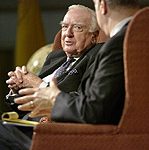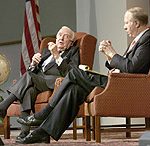Legendary CBS news anchor Walter Cronkite reflected on the key events of his career and shared his thoughts on current world affairs during an interview with former presidential adviser David Gergen Tuesday, April 8 in Alumni Gym. Details...
 Cronkite, who earlier in the day hosted a news conference with the local media, spoke with Gergen for more than an hour before 2,900 people in Alumni Gym. He shared tales from his days as a United Press International correspondent in World War II, where he honed his field reporting skills. “I came back as one of UP’s best reporters,” Cronkite said. “I had a great story; you couldn’t do anything wrong with it.”
Cronkite, who earlier in the day hosted a news conference with the local media, spoke with Gergen for more than an hour before 2,900 people in Alumni Gym. He shared tales from his days as a United Press International correspondent in World War II, where he honed his field reporting skills. “I came back as one of UP’s best reporters,” Cronkite said. “I had a great story; you couldn’t do anything wrong with it.”
Cronkite’s next journey into battle would come during the Vietnam War, and this time, millions of Americans relied on “Uncle Walter” to tell them the truth about the conflict.
“Americans were terribly confused about that war,” he said. When Cronkite returned, he shared his opinion that the U.S. would not win the war, but that it would end in a stalemate. Many historians believe Cronkite’s opinion was a major factor in President Lyndon Johnson’s decision not to run for re-election in 1968.

“We always tried to be in the middle of the road with our coverage of Vietnam,” Cronkite said. “We got a lot of mail criticizing our coverage, but we always kept two bags of mail, one with the letters praising our coverage, and the other with the letters against it. I always thought if those two bags weighed about the same, then we were doing a pretty good job.”
Asked to reflect on some of the U.S. presidents he covered, Cronkite discussed John F. Kennedy’s ascension from the Senate to the Oval Office. “I liked Kennedy as a senator quite a lot, but then as he got into the presidential race, I began to understand what others had told me, that there was a Kennedy arrogance.”
But when Kennedy was assassinated in 1963, Cronkite nearly broke down on live television as he delivered the news to a stunned nation. He said Kennedy’s assassination “was an exclamation point to the worst decade we’ve had in this country, except perhaps for the Civil War.”
Cronkite also had high praise for President Johnson, who abandoned his segregationist stance once elected to the White House. “I admired LBJ. Here was a man who was a Southwesterner, a Texan, who led the fight to maintain segregation until he became president of all the people,” Cronkite said. “I thought that political courage, to change his field, was the likes of which we have seldom seen.”
The 86-year-old Cronkite, who retired from CBS in 1981, also expressed concern about recent U.S. foreign policy and the war in Iraq. “I don’t like arrogance in government, and I think our government has been quite arrogant in foreign policy in recent years,” Cronkite said, citing the U.S. withdrawal from the Kyoto Agreement and its cancellation of the Anti-Ballistic Missile Treaty. “Canceling the ABM treaty will lead to another arms race,” Cronkite said.
He said he worries the unilateral approach the U.S. has taken in Iraq is alienating other nations. “Now we’re saying we don’t want any part of anyone else helping us to rebuild Iraq. That’s no way to regain friends and rebuild Iraq.”


